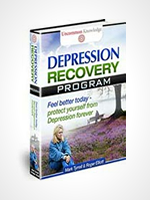Overcoming Depression - Counseling and Therapy
Having come this far along the Depression Learning Path, you should understand the difference between simply treating the symptoms of depression with drugs and overcoming depression for good.
Here we're going to look at what research has shown to be the best type of depression counseling for overcoming depression permanently. You should already know the types of depression counseling to avoid from the last step.
Many professionals advocate a combination of drug therapy and psychotherapy, but more and more studies show that medication is unnecessary if the sufferer receives the right sort of help. (1)
(If you haven't completed the Learning Path this far, we strongly recommend that you do so now. A complete understanding of depression is essential if you're going to beat it. You can start here.)
As well as overcoming depression if you have it now, knowing exactly what depression is means you can recognize the onset of future episodes, if they occur. Gaining new skills, or being able to challenge depressive thinking and behavior at the onset, means you can be confident about leading a depression-free life. Good depression counseling will help you learn these skills.
As we have seen along the Depression Learning Path, counseling or therapy that is effective in overcoming depression focuses on:
- What we do. (Behavioral therapy)
- How we think about things. (Cognitive therapy)
- How we relate to others. (Interpersonal therapy)
- How things are going to be better in the future. (Solution focused therapy)
- Getting our basic emotional needs met in the wider world
- Helping you find solutions to your immediate problems
And NOT on why you are depressed, or what went wrong in the past. These types of therapy, far from overcoming depression, will tend to make it worse. (For those of you who have been through the whole Depression Learning Path, this will be repetition we realise. However, it is such an important point, we hope you will bear with us!)
A combination of these above approaches has been shown to work best.
Here's a quick description of the types of therapy found to be effective in beating depression.
(Just so we get it straight, therapy and counseling are the same thing, although counseling is more often the non-directive stuff to avoid if you're depressed!)
Behavioral therapy for depression
The basic idea of behavioral theory is that everything amounts to behavior and inner processes are of little or no account. So if people feel miserable it is because of their behavior. Traditional behavioral therapists are less interested in the thoughts and emotions of their patients and more concerned with their behavior as can be observed
Changing peoples' behavior can have dramatic results but it is now known that people's perceptions and thought processes are also vitally important when overcoming depression.
Cognitive therapy for depression
Cognitive therapy works on the basic premise that all emotion comes from thoughts. For example: If you think about something scary, you will feel fear.
Basically, the idea behind cognitive therapy is that people learn to 'catch' their thoughts and challenge them so that they can feel differently.
Working on your thinking styles is absolutely essential if you suffer from depression. Any therapist or counselor who does not address this with you is going about it the wrong way!
Recent studies of how the brain works have shown that certain emotions occur before thoughts and it is possible to be afraid of something before we can think what it is. However cognitive therapy, if applied skillfully, has done very well in the research for lifting and preventing relapse of depression.
(The danger with cognitive therapy is that it becomes too complex for the patient to understand, so it must be applied with skill, and with consideration for the patient's way of learning.)
Interpersonal therapy for depression
This approach focuses on the way people relate with other people in their lives - how they communicate and express themselves. Whether a person is assertive, aggressive or timid or has 'social skills' is seen as key.
Extremely common in depression sufferers is the lack of satisfaction in various relationships: family, work, social. Depression can cause us to lose access to the skills and the desire to sustain these relationships successfully.
Whether it be feelings of wanting to be alone, not knowing what to say, or just feeling wretched and not wanting to be in company, a large percentage of depression sufferers exhibit what is crudely called "poor social skills" such as:
- Being less assertive
- Being less positive
- Showing negative facial expressions and poor eye contact
- Displaying less interaction in group situations
- Unwittingly carrying out 'off-putting' social behavior such as innapropriate questioning, too much or too little self-disclosure, or missing out small-talk.
Again this therapy can be seen as practical, sensible and very helpful for some people as communication skills are 'teachable'.
However like all the other approaches it's not the whole story.
Solution focused therapy for depression
As it's name suggests, the emphasis here is on finding solutions to current problems and focusing on future wellness rather than past hurts. This is not to say that the past is ignored but the main emphasis is on teaching new skills and keeping therapy brief and focused.
It is an extremely hopeful and motivational form of therapy when applied skilfully.
Next article: Getting Help with Depression
Each therapy type contributes greatly to overcoming depression. Good depression counseling uses all these approaches in a skilful blend. In Getting Help with Depression, we'll look at the core elements of successful help for depression.
- Teasdale, J. D. et al. (2000) Prevention of relapse/recurrence in major clinical depression by mindfulness-based cognitive therapy. Journal of Consulting and Clinical Psychology, 68, 4, 615–23.







